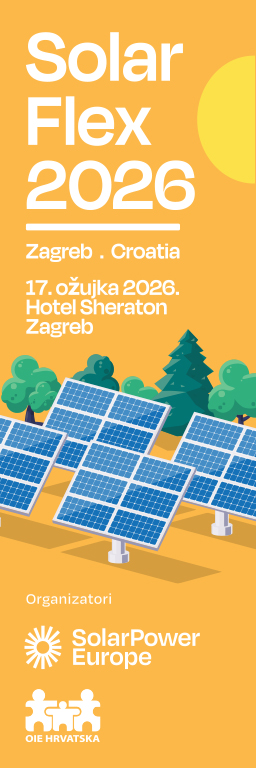Launch of the Study on the Use of Battery Storage in Croatia’s Electricity Grid
Science and Economy Together for a Faster Green Transition
Zagreb, 8 July 2025 – Renewable Energy Sources of Croatia (RES Croatia) and the European Bank for Reconstruction and Development (EBRD) are collaborating on the development of an expert study titled “Identification of Congestion Locations in the Electricity Grid and Battery Energy Storage Needs in the Republic of Croatia.” The study will be conducted by the Energy Institute Hrvoje Požar (EIHP) and the Faculty of Electrical Engineering and Computing (FER) of the University of Zagreb, highlighting the importance of collaboration between science and economy when it comes to accelerating the energy transition and achieving national climate goals.
More than 50% of Croatia’s transmission network has exceeded its planned lifespan, and its modernization is a lengthy process requiring substantial investment. At the same time, the electricity system is facing challenges related to flexibility and limited storage capacity for surplus electricity from renewable sources. During the summer of 2024, Croatia imported as much as 25% of its electricity, partly due to a lack of storage capacity.
The targeted implementation of battery energy storage systems can ease the burden on the network, enhance supply security, and enable better utilization and sustainable integration of domestic renewable energy production into the electricity grid.
“This collaboration clearly demonstrates the importance of connecting scientific institutions with the concrete economy needs. The European Union’s latest target – a 90% reduction in greenhouse gas emissions by 2040 – obliges Member States to establish clear annual goals for increasing the share of renewable energy sources in the period from 2031 to 2040. Modern electricity infrastructure, including battery energy storage systems, will play a key role in achieving these goals. This study will contribute to energy supply security and help achieve the goals set out in the National Energy and Climate Plan. A higher share of renewable energy sources, which will be made possible by a more flexible grid, means lower energy costs, a more competitive and energy-independent economy, and greater supply security for both industry and citizens,” said Maja Pokrovac, Director of RES Croatia.
As a long-standing partner in the energy transition of Croatia, the EBRD recognizes battery storage as a key component in creating a more resilient, flexible, and sustainable electricity system. “This study will provide concrete guidelines for further infrastructure development, and we are particularly pleased that its preparation involves top scientific institutions. We believe the results will serve as a foundation for making strategic decisions and attracting investments that will bring long-term benefits to the Croatian economy and citizens,” said Miljan Ždrale, EBRD Regional Director for Central Europe.
“One of the key values of this study lies in its comprehensive approach. In addition to the technical analysis of grid congestion and battery storage needs, the study will also include an analysis of the regulatory framework with the aim of identifying obstacles to their successful implementation. Special emphasis will be placed on financial aspects: estimating the cost of building storage systems and their impact on the overall electricity system costs. The study will take into account the broader regional context and the accelerated growth of renewable energy sources, not only in Croatia but throughout Southeast Europe, including an analysis of the effects of battery storage on cross-border electricity exchange and market price trends. The analyses will be conducted through the best energy and market modeling tools that EIHP experts have been successfully using for many years,” emphasized Dražen Jakšić, Director of EIHP.
“Collaboration with the energy sector on such important and strategic projects confirms the key role of science in accelerating the green transition. As part of this study, the team from the Faculty of Electrical Engineering and Computing (FER) is responsible for conducting technical analyses that will serve as the foundation for decision-making regarding the future development of the transmission network and the installation of battery storage systems. Our researchers will analyze the potential for renewable energy evacuation, identify system bottlenecks, and determine the optimal locations and capacities of storage systems. Ultimately, the goal is to contribute to greater reliability and flexibility of the electricity grid, creating the conditions for full and sustainable integration of renewable sources. FER has been actively cooperating with the industry for many years and is involved in the development of advanced solutions for the electricity system. The synergy with partners such as EIHP, RES Croatia, and the EBRD is the best example of how combining expertise and science can provide concrete answers to the challenges of energy transition. This study marks a step forward toward a more energy-independent, resilient, and sustainable Croatia,” said Professor Igor Kuzle, Ph.D., from FER.
The study will generate a proposal for the optimal technical solution for battery storage systems in the electricity system, along with legislative and regulatory recommendations that would enable its optimal implementation. These results will contribute to the strategic planning of key stakeholders in the electricity sector, including HERA, HOPS, and HROTE, who welcome this study and will have an advisory role in its development. The study will be completed by the end of 2025, and it will be publicly presented and made available for further use to support the development of a sustainable and competitive energy system in Croatia.

















